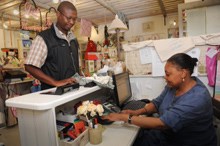
It says that although Visa claims R1bn will be spent during the World Cup, SureSwipe believes that this is probably mostly finding its way into the pockets of ticket vendors, airlines, car hire companies, accommodation and restaurants in major cities.
"The small retailer is reporting a very slow month in June," Paul Kent, MD of SureSwipe reported. "There could be many reasons, those who have saved up to buy Cup tickets will have less disposable income and there have been some very cold days in June, which could be impacting on spend." He discounted the fact that many families were travelling around the country with longer school and university holidays, adding, "Their spending should be showing up in rural areas, but it is not."
The company's figures show that the average rand value spent in April last year was R264.96 per debit card swipe and leapt to R289.41 in April 2010. However, in June when families traditionally spend more on holidays, R345.36 was the average debit card swipe in 2009, which dipped to R294.85 in June this year - 14.6% drop.
Similarly credit card swipes - which always tend to be higher than those for debit cards - were R425.36 on average in April last year and rose to R457.52 this year, however, it dipped to R443.13 per swipe in May and dropped further to R439.71 in June. Last year by comparison credit card swipes in May last year were R443.30 and R476 in June, a 7.6% drop.
The figures show that projections around the World Cup have fallen far short of what has happened, around a third less visitors have arrived than the 455 000 long predicted and spend is not as extravagant as hoped for.
In November last year, the Deputy Minister of Water and Environmental Affairs, Rejoice Mabudafhasi told the press that the tournament, was expected to inject R55 billion into the economy. She also said, "The country's GDP will be boosted by R33 billion in direct spending on stadiums and infrastructure, while soccer fanatics will spend some R8 billion rand and tickets sales will generate R6 billion," she said. She said government would rake in about R19 billion in tax revenue.
Kent said it appeared that those figures could fall short of target.
"We also have a situation where after a shaky economic start to the year, consumers began showing more confidence as banks started allowing more credit access. However, the volcanic ash situation in Europe disrupting exports and threatening jobs along with a strong rand and followed by very troubling economic news from the Eurozone has seen those with higher incomes - the ones most likely to use credit cards - rein in spending as they watch economic developments in Europe and here."
He said too that at this time of year medical aid savings tended to start running out "and so consumers also curb spending because they are having to pay medical bills for flu and associated winter illnesses. It is too early to say whether the World Cup has reaped dividends for storeowners, but at this stage, it appears that many hopes might be dashed.
"Instead of focussing on short term failed expectations, we should focus on the long term and the positive lessons learned during the Cup. The international media have painted glowing pictures of South Africa as a tourist destination and globally that is a significant income earner and job creator. If we can maintain the positive attitudes generated during the World Cup then we have a very good foundation to continue building on," he concluded.